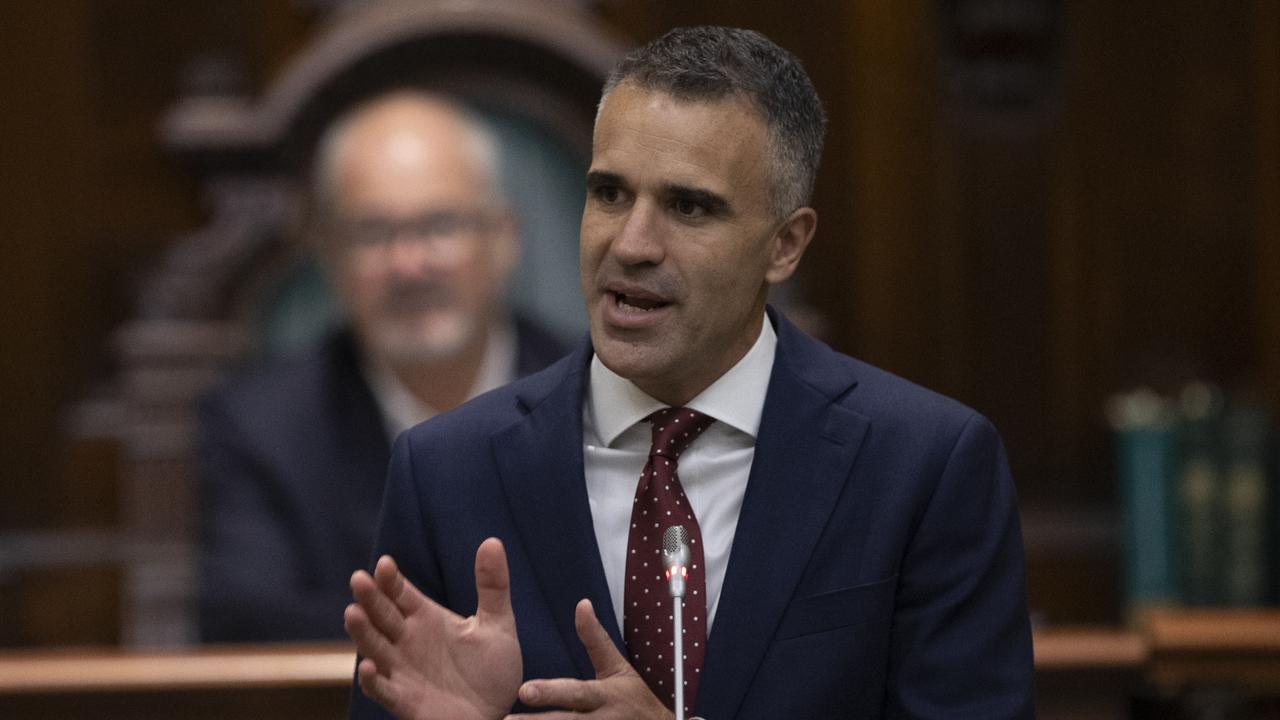Adelaide Extinction Rebellion activists explain what they’re doing to help
Extinction Rebellion protesters have dismissed the concept of a “personal carbon footprint” as they point to big companies for passing the blame on pollution.

SA News
Don't miss out on the headlines from SA News. Followed categories will be added to My News.
Extinction Rebellion protesters have dismissed the concept of a “personal carbon footprint” when describing the energy use of their own lifestyles.
The concept, they argued, was created by big energy companies trying to avoid blame for their own destructive behaviour.
The Advertiser on Thursday talked to six protesters outside the Adelaide Magistrates Court about their own personal energy use, and whether they have mobile phone, laptops, cars, home heating, and employment.
Andrew Derrington, 69, said those hit hardest in the climate crisis were mainly in the developing world and used very little energy.
“This idea came out of the fossil fuel companies, to try and make the individual responsible instead of themselves,’’ he said.
Mr Derrington said he was retired, had a mobile phone, no laptop, a desktop computer, a cheap car, and little heating.
“All my life I have bought second-hand clothes, I’ve never spent more than $2000 on a car and I fix them all up,’’ he said.
“Way before the impact of climate change was realised, I decided I just didn’t want to consume.
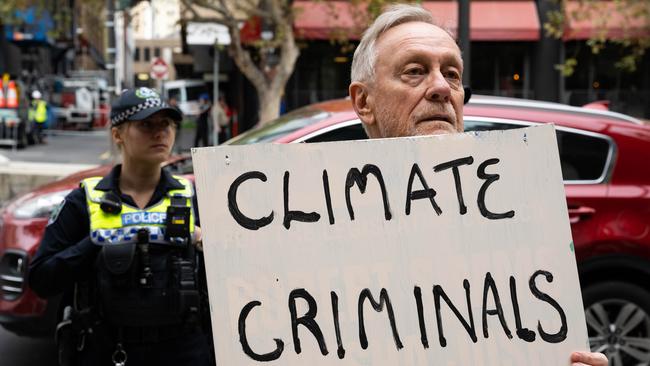
“As a senior I travel for free on public transport and I use that a lot.
“I’m in a big old housing trust house with high ceilings so tend to use the long johns, you know, and I have a little heater I put right next to me.
“I’m on gas for hot water and heating.”
Kylie is vegan, walks 40 minutes to work, has a car for weekends, very limited ecological home heating, a mobile phone and a laptop.
“I do a lot of bush care, and I walk to work, and all those kind of things.
“The reason we are in this climate crisis we are in is because of large corporations and governments.
“They are in charge and the vast majority of the problem is what they do, not the individual.”
Karen said she is retired, has no car, has a mobile phone, a laptop but uses the buses.
“I’m 68 now and I have caught buses for my entire adult life,’’ she said.
“I don’t know how you would live without modern technology. Like my volunteer work, how would I organise that?
“Unfortunately you have to use the gadgets knowing there is a problem with them. It has been made that it is obligatory to use technology so that nothing else is available, and companies profit from that.
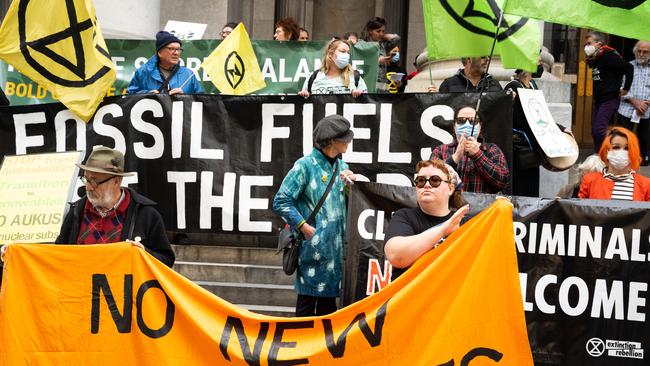
“I am very careful about what I use and how much I use and still am able to achieve a social purpose and environmental purpose.”
Louis said his biggest personal contribution was through protests, had a phone and laptop, did not use house heating and had no car.
“The best action I take is nonviolent disobedience to protest against the fossil fuel industry,’’ he said.
“I recycle a lot of clothing and they make it too hard to do.
“If you have broken clothing they are causing methane by going into landfill.
“But it is hard to recycle and we really need to normalise that. Zara’s do have recycling so I take mine there.”
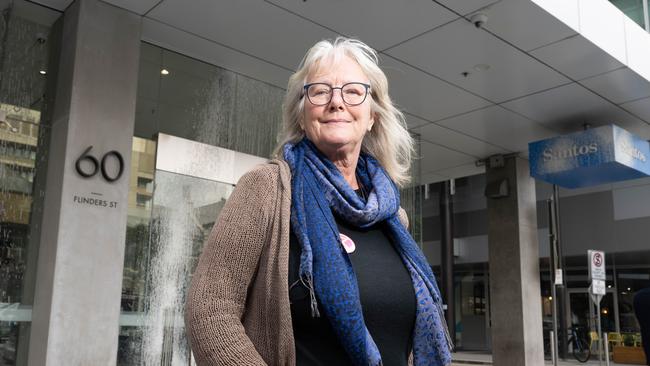
Jane Morton, 70, said “of course, we drive cars and use fossil fuels” when asked about her personal usage of cars, mobile phones and heating her home, but believes there’s no alternative.
“We need the government is take responsibility because we have big corporations that are continuing to open up new gas and oil, and there is no way the ordinary person can do much about that, expect to protest,” she said.
“At moment, there’s no alternative. Individual action is not going save this, it’s too late.
“We have to all do what we can to shift government and shift the big corporations, otherwise we will fry.”
Ms Morton said despite her carbon footprint, she believes “we’re on the edge of tipping points”.
“Scientist are desperately trying to tell people that we’re risking out of control warming, and the questions we get asked are about plastic and phones,” she said.
“If a fire was approaching, (you wouldn’t say) oh, what’s happening in your home? Did you light a fire at the back? You would be warning people, that there’s a fire coming and it’s coming in this direction.”
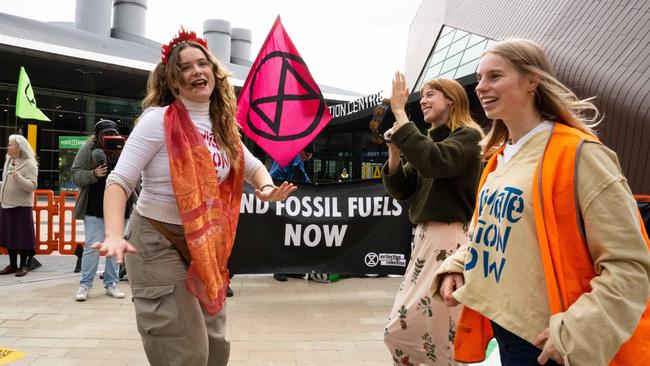
Ms Morton said she and other members of the group, including medical students, doctors and engineers, have cut back on working to advocate for climate change.
The retired psychologist said she doesn’t received any government assistance and believes the federal budget was “not a climate emergency budget”.
Harald Ehmann, 76, said his personal usage was “not the focus of (their) action and (their) interest – their interest is in the truth”.
“The truth is that climate crisis, not whether we drive a car or how we’re trapped in the toxic system,” Mr Ehmann said.
“We minimise our carbon footprint to the best our capacity, given that we are all trapped in a very toxic system. Everybody is struck in the system.”
“I and most of my colleagues do the best that we can to minimise our that carbon footprint.”
Mr Ehmann said he “doesn’t have a choice” other than to use a mobile phone, and refused to disclose his profession, despite saying he has “three jobs and contributes to society”.



